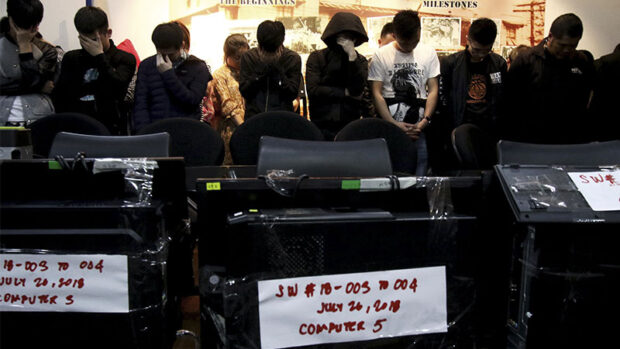
ILLEGAL OPERATION | In this 2018 photo, National Bureau of Investigation agents seize computers and arrest a group of Chinese behind online illegal gambling operations in Muntinlupa City. (File photo by RICHARD A. REYES / Philippine Daily Inquirer)
MANILA, Philippines — The primary unit of the Department of Justice (DOJ) tasked with going after cybercriminals would only get P475,000 in confidential funds for 2024.
Senators said they found much wanting this allotment for the DOJ’s Office of Cybercrime (OOC) — as disclosed by Senate Deputy Majority Leader JV Ejercito during the Senate’s budget deliberations on Monday — given the proliferation of online scams in the country.
Scrutinizing the DOJ’s budget proposal of P34.5 billion for next year, Ejercito noted the measly amount that the Department of Budget and Management had set aside for the OOC.
Justice Secretary Jesus Crispin Remulla said the OOC and the National Bureau of Investigation Cybercrime Division really needed financial support, as these offices were usually assigned to investigate text scams, online fraud, and other such crimes.
“We need to augment [this funding] because we need to [go after] the hackers and other cybercriminals,” Ejercito said. “Considering that other agencies, especially those civilian in nature, are asking for confidential and intelligence funds (CIFs), these are the agencies that we really have to fund,” he added.
“Cybercrime is a daily problem that all Filipinos are encountering. This is a new enemy that we are facing right now,” he stressed.
READ: DOJ on anti-cybercrime fund: ‘Almost all crimes now have cyber content’
READ: Senators worry: Can DICT fight cybercrimes without intel funds?
READ: Over 16,000 cybercrimes logged from January to August 2023 — PNP
Understaffed
Ejercito said the appropriations for the DOJ, NBI, and other attached agencies were “justifiable,” since they spend huge amounts for the Witness Protection Program (WPP) alone.
He said the NBI, the DOJ’s main law enforcement unit, was allotted P175 million in confidential funds.
Remulla pointed out that the DOJ’s cybercrime unit has only 20 staff members — or just 10 percent of its required personnel.
“Actually, if we will have cybercrime prosecutors, we will be needing at least 200 people for this because 90 percent of the crimes committed nowadays have cybercrime content,” the justice chief said.
“In fact, we have not heard of bank robbers physically attacking banks anymore. The money is now being stolen through computers and [mobile] phones,” he added.
Funds for WPP
In response to the question of Sen. Juan Edgardo Angara, the chair of the Senate finance committee, on whether the DOJ’s efforts might only duplicate the work of the Department of Information and Communications Technology (DICT), Remulla said the two departments have different mandates.
“For us, it’s prosecution and criminal investigation,” Remulla said. “The DICT is more on the technical side.”
Besides the NBI and OOC, Remulla said the WPP was allotted P1 billion in confidential funds; the Office of the Secretary, P250 million; Office of the Solicitor General, P19.2 million; and Inter-Agency Council Against Trafficking, P10 million. Senate Minority Leader Aquilino Pimentel III suggested that the DOJ list down its proposed spending for the WPP as line budget items, to make its annual expenditure plan more transparent.
To this, Remulla responded, “The nature of the job [of the WPP] is really very dangerous.”
“We cannot do the things we do through the ordinary procurement system, like renting safe houses and the allowances that we give to [witnesses],” he explained further.
SolGen funds
Upon Pimentel’s prodding, Solicitor General Menardo Guevarra decided to let go of his request for confidential funds.
“Considering what we have heard, we believe you may have the discretion to just reallocate [the funds] to other agencies which are more in need of confidential funds,” Guevarra said.
Foreign Secretary Enrique Manalo and Ombudsman Samuel Martires had earlier told the Senate that they would give up confidential funds for their agencies.
Under the proposed P5.768-trillion national budget for 2024, the Department of Foreign Affairs (DFA) was allotted P50 million while the Office of the Ombudsman was allotted P51.5 million.
Senate President Juan Miguel Zubiri said the allocations of the DFA and the Ombudsman would be realigned to the Philippine Coast Guard and National Intelligence Coordinating Agency, respectively.
The controversy over CIFs was prompted by the P500 million and P150 million sought by Vice President and Education Secretary Sara Duterte for her two offices.
The House of Representatives has formed a “small committee” currently deliberating on the transfer of those funds to agencies with surveillance and intelligence activities in connection with the West Philippine Sea.